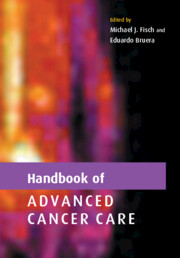Book contents
- Frontmatter
- Contents
- List of contributors
- Preface
- Acknowledgements
- PART I General concepts in oncology
- Part II Primary tumors
- Part III Management of specific symptoms and syndromes
- 41 Assessment of pain
- 42 Drugs for managing cancer pain
- 43 Difficult pain management problems
- 44 Dyspnea
- 45 Loss of appetite and weight
- 46 Fatigue
- 47 Depression and anxiety
- 48 Delirium
- 49 Constipation
- 50 Palliation of fever and sweats: the heat is on!
- 51 Bleeding in advanced cancer patients
- 52 Thrombosis
- 53 Hypercalcemia of malignancy
- 54 Lymphedema
- 55 Wound care of the advanced cancer patient
- 56 Infections in patients with advanced cancer
- 57 Urogenital complications
- 58 Brain metastases
- 59 Bowel obstruction
- 60 Bone metastases
- 61 Meningeal cancer
- 62 Pleural and pericardial effusions
- 63 Superior vena cava syndrome
- 64 Chronic nausea
- Index
- References
64 - Chronic nausea
Published online by Cambridge University Press: 04 August 2010
- Frontmatter
- Contents
- List of contributors
- Preface
- Acknowledgements
- PART I General concepts in oncology
- Part II Primary tumors
- Part III Management of specific symptoms and syndromes
- 41 Assessment of pain
- 42 Drugs for managing cancer pain
- 43 Difficult pain management problems
- 44 Dyspnea
- 45 Loss of appetite and weight
- 46 Fatigue
- 47 Depression and anxiety
- 48 Delirium
- 49 Constipation
- 50 Palliation of fever and sweats: the heat is on!
- 51 Bleeding in advanced cancer patients
- 52 Thrombosis
- 53 Hypercalcemia of malignancy
- 54 Lymphedema
- 55 Wound care of the advanced cancer patient
- 56 Infections in patients with advanced cancer
- 57 Urogenital complications
- 58 Brain metastases
- 59 Bowel obstruction
- 60 Bone metastases
- 61 Meningeal cancer
- 62 Pleural and pericardial effusions
- 63 Superior vena cava syndrome
- 64 Chronic nausea
- Index
- References
Summary
Chronic nausea is a common, unpleasant symptom in patients with advanced cancer. The distress associated with nausea has enormous impact on the quality of life of this group of patients. More than half of cancer patients report nausea as one of the most distressing symptoms they encounter during the trajectory of their illness. Nausea is particularly prevalent in patients under age 65, females, patients receiving opioid analgesics, and patients with stomach, breast, or gynecologic cancer.
There is no consensus on the definition of chronic nausea, but for the purpose of research it is defined as nausea lasting longer than 4 weeks.
Etiology
Causes of nausea in cancer patients are often multifactorial – they may be related to the cancer itself or the treatment for the cancer. Figure 64.1 summarizes common causes of nausea in cancer patients.
Gastrointestinal causes are common. Amongst the gastrointestinal causes of nausea, constipation is probably the most prevalent etiology. Advanced cancer patients are frequently taking opioid analgesics that cause delayed gastric emptying and slower intestinal transit time. In addition, decreased mobility, poor hydration, and co-exposure to other medications that contribute to constipation are often seen in this population (see Chapter 49).
Nausea and constipation may also be manifestations of chronic malignant bowel obstruction (see Chapter 59). Such obstruction can result from locally advanced disease such as gynecologic and gastrointestinal malignancies or adhesions in patients with prior abdominal surgeries or previous abdominal radiation.
- Type
- Chapter
- Information
- Handbook of Advanced Cancer Care , pp. 491 - 499Publisher: Cambridge University PressPrint publication year: 2003



